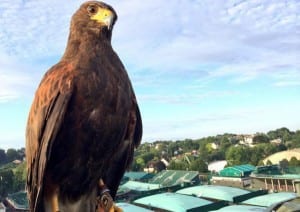
by Pigeon Patrol | Nov 5, 2015 | Animal Deterrent Products, Bird Deterrent Products, Bird Netting, Pigeon Patrol's Services, Pigeon Spikes, UltraSonic Bird Control
 IN “THE silence of the birds” (Jan 4), wildlife scientist Umesh Srinivasan said that logged forests being converted into oil palm plantations have next to zero value for tropical biodiversity.
IN “THE silence of the birds” (Jan 4), wildlife scientist Umesh Srinivasan said that logged forests being converted into oil palm plantations have next to zero value for tropical biodiversity.
In land-scarce Singapore, what little that is left of our pristine primary tropical forests is mainly confined to the catchment areas, nature reserves and some offshore islands. Biodiversity can occur only with minimum human encroachment.
Wildlife can either adapt, move on or perish. Some animals have found new food sources and shelter in our urban environment and some have even flourished.
The most ubiquitous is the mynah bird, which can be seen all around, from parks to hawker centres. Their nightly gathering on roadside trees in large numbers is a constant source of nuisance, with their noise and droppings.
Another is the pigeon. If fed by people who disregard feeding prohibitions, their numbers can explode quickly. Their droppings also transmit diseases.
Cutting down trees or drastically trimming tree canopies to reduce bird roosting is not sustainable as it reduces the amount of shade for pedestrians.
The prey-predator ratio should be restored. In nature, when this delicate balance is maintained, the pool of species preyed upon will not increase beyond the point that it causes depletion of food and water resources.
In Singapore, there seems to be very few indigenous birds of prey to help bring down the population of mynahs and pigeons.
We could emulate the US, where the peregrine falcon was released in various cities to help reduce the pigeon population.
Perhaps, the Agri-Food and Veterinary Authority could commission a study on which species of birds are most adaptable to living in Singapore’s city area and suburbs.
There could be a breeding and release programme. GPS devices could be attached to the released birds in a way that would not restrict their movements, just like the civet cats on Ubin (“Civets on Ubin get GPS collars”; Jan 23).
If this programme proves successful, we might be able to completely solve the problem caused by the huge population of mynahs and pigeons here.
About Pigeon Patrol:
Pigeon Patrol Products & Services is the leading manufacturer and distributor of bird deterrent (control) products in Canada. Pigeon Patrol products have solved pest bird problems in industrial, commercial, and residential settings since 2000, by using safe and humane bird deterrents with only bird and animal friendly solutions. At Pigeon Patrol, we manufacture and offer a variety of bird deterrents, ranging from Ultra-flex Bird Spikes with UV protection, Bird Netting, 4-S Gel and the best Ultrasonic and audible sound devices on the market today.
Voted Best Canadian wholesaler for Bird Deterrent products four years in a row.
Contact Info: 1- 877– 4– NO-BIRD (www.pigeonpatrol.ca)
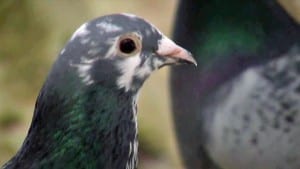
by Pigeon Patrol | Nov 4, 2015 | Bird Netting, Pigeon Patrol's Services, Pigeon Spikes, Pigeons in the News, UltraSonic Bird Control
 As many as 10,000 band-tailed pigeons may have died in California this winter, according to Krysta Rogers, an environmental scientist with the California Department of Fish and Wildlife (CDFW). Hard numbers are difficult to produce, because birds are difficult to monitor, but these estimates are based on reports of dead birds submitted by the public.
As many as 10,000 band-tailed pigeons may have died in California this winter, according to Krysta Rogers, an environmental scientist with the California Department of Fish and Wildlife (CDFW). Hard numbers are difficult to produce, because birds are difficult to monitor, but these estimates are based on reports of dead birds submitted by the public.
Band-tailed pigeons are California’s only native pigeon.
They are the West Coast version of the passenger pigeon, which was once the most abundant bird in North America, but it was hunted to extinction. Millions of band-tailed pigeons used to inhabit California but almost became extinct, and much of their habitat was destroyed. They were eventually protected by the Migratory Bird Treaty Act of 1918.
Band-tailed pigeons are not listed as endangered. The pigeons spend their winters in the higher elevations of California’s mountain ranges before migrating in early spring to the northernmost regions of Northern California, Oregon, Washington and British Columbia.
The sudden increase in mortality is disturbing and sad, especially because the closest living relative to the extinct passenger pigeon has been struggling for decades to recover from rampant hunting, habitat loss and other environmental problems.
Blame Non-Native Species and the Drought
The CDFW blames the deaths on Avian Trichomonosis, a disease caused by a single-celled microscopic protozoan parasite believed to have co-evolved with the common rock pigeon, which was introduced from Europe. It causes lesions to form in infected birds’ mouths and throats. The birds, which subsist largely on acorns that they swallow whole, are unable to move food down their throats and starve or can even suffocate.
What a horrible way to die.
Scientists believe that water sources, like bird feeders and stagnant pools, may play a role, and especially in the current drought conditions in California.
“These events seem to be more common in winters with less precipitation, so I do suspect there is some weather component in these mortality events,” Rogers said. “When you have large flocks and there is a disease like this circulating, and you have stagnant pools and puddles and not much flowing water, the parasite can become more concentrated in that small amount of water and the disease is going to spread more easily.”
As a result, California wildlife authorities are asking residents to take down bird baths and feeders if they spot sick or dead birds in their yards as experts closely monitor the massive die-off.
Destruction by Non-Native Species
I am reminded of what happened in New Zealand, a country I visited a month ago.
For millions of years, there were no land mammals in the country, so New Zealand birds evolved in isolation. Free from attack and competition from mammals, many birds became flightless ground-dwellers.
Migrating to New Zealand around 1250–1300, Polynesians brought kiore (the Pacific rat) and other animals. That spelled doom for those flightless birds.
The first birds to become extinct, within a century or two after human arrival, were the largest – all species of moa, both species of goose, and both adzebill species. Being flightless, all were quite easy to hunt and catch, yielding large quantities of meat. Their slow breeding rate meant they were lost faster than they could be replaced.
The list of New Zealand species known to have become extinct since human settlement includes one bat, at least 51 birds, three frogs, three lizards, one freshwater fish, four plant species, and a number of invertebrates
Then came the second wave of destruction. Europeans came in the late 18th century, bringing rats, cats, stoats, weasels and ferrets. The rabbit was introduced as a food and game animal by European settlers and by the 1870s, it was becoming a serious threat to the newly developed farming economy.
Farmers began demanding the introduction of mustelids (including stoats) to control the rabbit plague. Warnings about the dangers to bird life from stoats were given by scientists in New Zealand and Britain. However, the warnings were ignored and stoats began to be introduced from Britain in the 1880s. Within six years, drastic declines in bird populations were noticed.
The destruction in New Zealand continues.
And now the pattern is repeating itself in California, this time with the European-introduced rock pigeon potentially wiping out the native band-tailed pigeon.
How sad that tales of non-native species causing destruction keep repeating themselves around the world.
About Pigeon Patrol:
Pigeon Patrol Products & Services is the leading manufacturer and distributor of bird deterrent (control) products in Canada. Pigeon Patrol products have solved pest bird problems in industrial, commercial, and residential settings since 2000, by using safe and humane bird deterrents with only bird and animal friendly solutions. At Pigeon Patrol, we manufacture and offer a variety of bird deterrents, ranging from Ultra-flex Bird Spikes with UV protection, Bird Netting, 4-S Gel and the best Ultrasonic and audible sound devices on the market today.
Voted Best Canadian wholesaler for Bird Deterrent products four years in a row.
Contact Info: 1- 877– 4– NO-BIRD (www.pigeonpatrol.ca)
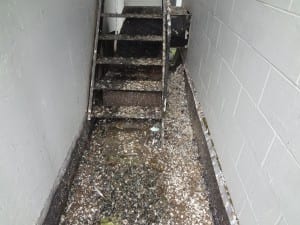
by Pigeon Patrol | Nov 3, 2015 | Animal Deterrent Products, Bird Deterrent Products, Bird Netting, Pigeon Patrol's Services, Pigeons in the News, UltraSonic Bird Control
 SAN FRANCISCO (CBS SF) — The owners of a San Francisco tofu company agreed in a consent decree filed in federal court Tuesday to cease operations until the U.S. Food and Drug Administration determines the company is selling clean and sanitary food.
SAN FRANCISCO (CBS SF) — The owners of a San Francisco tofu company agreed in a consent decree filed in federal court Tuesday to cease operations until the U.S. Food and Drug Administration determines the company is selling clean and sanitary food.
The consent decree concerning the Fong Kee Tofu Co. Inc. was filed in the court of U.S. Magistrate Kandis Westmore in Oakland.
The settlement stems from a civil lawsuit filed against the company and owners Yan Hui Fong, Jen Ying Fong and Suny Fong on Jan. 23 by the U.S. Justice Department at the request of the FDA. The lawsuit alleged that unsanitary conditions at the company were causing its products to become adulterated.
It alleged that FDA inspectors last year observed pigeons on top of plastic-wrapped raw soybean pallets, insects flying around the area used to process firm tofu, lack of proper handwashing by employees, and residue on equipment that was supposed to have been cleaned.
Kasie Lee, a lawyer for the company and its owners, could not immediately be reached for comment.
Acting Assistant U.S. Attorney General Joyce Branda said in a statement, “Fong Kee Tofu was repeatedly informed that the sanitation practices at its facility were deficient.”
“The failure to make sure that its facility was operating under sanitary conditions could be a serious risk to the public health and needed to be remedied,” Branda said.
The company’s products include firm tofu, soft tofu, fried tofu balls, soybean cake and soy drinks made from soybeans from Missouri, according to the lawsuit.
The company and owners agreed in the consent decree to be bound by a permanent injunction that requires them to stop preparing, manufacturing, packaging and selling the products.
If they wish to resume operations, they must hire an outside sanitation expert, labeling expert and auditor to develop and monitor a program for preparing uncontaminated and correctly labeled food. The experts can be three separate people or the same person.
The company cannot resume its business until it receives written authorization from the FDA. It would then be subject to FDA inspections without prior notice, under the injunction.
About Pigeon Patrol:
Pigeon Patrol Products & Services is the leading manufacturer and distributor of bird deterrent (control) products in Canada. Pigeon Patrol products have solved pest bird problems in industrial, commercial, and residential settings since 2000, by using safe and humane bird deterrents with only bird and animal friendly solutions. At Pigeon Patrol, we manufacture and offer a variety of bird deterrents, ranging from Ultra-flex Bird Spikes with UV protection, Bird Netting, 4-S Gel and the best Ultrasonic and audible sound devices on the market today.
Voted Best Canadian wholesaler for Bird Deterrent products four years in a row.
Contact Info: 1- 877– 4– NO-BIRD (www.pigeonpatrol.ca)
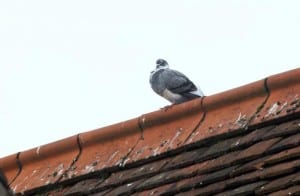
by Pigeon Patrol | Nov 2, 2015 | Animal Deterrent Products, Bird Netting, Pigeon Spikes, UltraSonic Bird Control
 During one of the worst winters on record for native pigeons dying of disease, state officials continue to seek public assistance in monitoring the disease’s progression and removing transmission sources from their yards.
During one of the worst winters on record for native pigeons dying of disease, state officials continue to seek public assistance in monitoring the disease’s progression and removing transmission sources from their yards.
The band-tailed pigeon is the only pigeon native to California. It is especially susceptible to avian trichomonosis, a disease caused by a single-cell protozoan called Trichomonas gallinae.
The protozoan is believed to have co-evolved with the common rock pigeon, which was introduced from Europe. It causes lesions to form in infected birds’ mouths and throats. The birds, which subsist largely on acorns that they swallow whole, are unable to move food down their throats and starve or can even suffocate.
A state scientist said the ongoing drought may be aiding in the disease’s transmission among the band-tailed pigeon population.
“These mortality events seem to occur more frequently in winters with lower precipitation, so it’s certainly possible that the mortality events that we’re seeing this winter are related to drought conditions,” said Krysta Rogers, an environmental scientist with the California Department of Fish and Wildlife.
The drought has reduced the number of available water sources, thereby concentrating the numbers of birds at remaining watering holes.
“Anytime you have a small volume of water and lots of band-tailed pigeons utilizing it, if there is this parasite circulating within the population, it can spread more rapidly in that close contact,” Rogers said.
Rogers gave a rough estimate that as many as 10,000 band-tailed pigeons have died in California this winter as a result of the disease. Hard numbers are difficult to produce, because birds are difficult to monitor. Current estimates of the disease’s impact are based on reports of dead birds submitted by the public.
Rogers said the department is continuing to ask for citizens to report on sick or dead birds that they find.
You can report on ill or dead birds at the California Department of Fish and Wildlife’s Mortality Reporting website.
The department is also asking for residents to remove feeders, birdbaths and fountains until the pigeons leave their wintering grounds. Rogers said that it’s unclear whether past calls for restricting the features have aided in disease control but that the request is logical.
“I can’t really put a number on whether or not it helps, because I don’t know if people are actually doing it or not,” Rogers said. “I think it’s one of the easiest things that can be done. If that bird feeder and that bird bath aren’t available for wild birds, then disease transmission definitely will not happen there.”
About Pigeon Patrol:
Pigeon Patrol Products & Services is the leading manufacturer and distributor of bird deterrent (control) products in Canada. Pigeon Patrol products have solved pest bird problems in industrial, commercial, and residential settings since 2000, by using safe and humane bird deterrents with only bird and animal friendly solutions. At Pigeon Patrol, we manufacture and offer a variety of bird deterrents, ranging from Ultra-flex Bird Spikes with UV protection, Bird Netting, 4-S Gel and the best Ultrasonic and audible sound devices on the market today.
Voted Best Canadian wholesaler for Bird Deterrent products four years in a row.
Contact Info: 1- 877– 4– NO-BIRD (www.pigeonpatrol.ca)
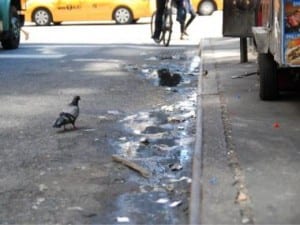
by Pigeon Patrol | Nov 1, 2015 | 4-S Gel Bird repellent, Bird Deterrent Products, Bird Netting, Pigeon Spikes, UltraSonic Bird Control
 About 20 pigeons were killed by the driver of a blue van in the parking lot of the Vallejo public boat launch Sunday afternoon, in what Vallejo police say appears to be a deliberate act of animal cruelty.
About 20 pigeons were killed by the driver of a blue van in the parking lot of the Vallejo public boat launch Sunday afternoon, in what Vallejo police say appears to be a deliberate act of animal cruelty.
A woman who regularly feeds birds had started feeding pigeons in the area, near the former Brinkman’s Marine business, when a van parked in the lot drove through the flock of birds, killing at least 20.
Vallejo police Lt. Kevin Bartlett stated that due to the suddenness of the action, they have no suspect description other than that of the van.
Local bird rescue and animal control agencies have been contacted for custody and treatment of about five surviving birds.
About Pigeon Patrol:
Pigeon Patrol Products & Services is the leading manufacturer and distributor of bird deterrent (control) products in Canada. Pigeon Patrol products have solved pest bird problems in industrial, commercial, and residential settings since 2000, by using safe and humane bird deterrents with only bird and animal friendly solutions. At Pigeon Patrol, we manufacture and offer a variety of bird deterrents, ranging from Ultra-flex Bird Spikes with UV protection, Bird Netting, 4-S Gel and the best Ultrasonic and audible sound devices on the market today.
Voted Best Canadian wholesaler for Bird Deterrent products four years in a row.
Contact Info: 1- 877– 4– NO-BIRD (www.pigeonpatrol.ca)

 IN “THE silence of the birds” (Jan 4), wildlife scientist Umesh Srinivasan said that logged forests being converted into oil palm plantations have next to zero value for tropical biodiversity.
IN “THE silence of the birds” (Jan 4), wildlife scientist Umesh Srinivasan said that logged forests being converted into oil palm plantations have next to zero value for tropical biodiversity.







